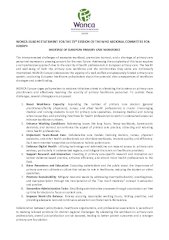
WONCA EUROPE STATEMENT FOR THE 73rd SESSION OF THE WHO REGIONAL COMMITTEE FOR EUROPE SHORTAGE OF EUROPEAN PRIMARY CARE WORKFORCE
WONCA EUROPE STATEMENT FOR THE 73rd SESSION OF THE WHO REGIONAL COMMITTEE FOR EUROPE
SHORTAGE OF EUROPEAN PRIMARY CARE WORKFORCE
The interconnected challenges of excessive workload, premature burnout, and a shortage of primary care personnel represent a pressing concern for the near future. Addressing the complexity of this issue requires a comprehensive approach due to the scarcity of health professionals in European primary care. The health and well-being of both the primary care workforce and the communities they serve are intrinsically intertwined. WONCA Europe underscores the urgency of a well-staffed and adequately funded primary care system, cautioning European healthcare policymakers about the potential dire consequences of workforce shortages and underfunding.
WONCA Europe urges policymakers to endorse initiatives aimed at alleviating the burdens on primary care practitioners and effectively resolving the scarcity of primary healthcare personnel. To combat these challenges, several strategies are proposed:
1. Boost Workforce Capacity: Expanding the number of primary care doctors (general practitioners/family physicians), nurses, and allied health professionals is crucial. Encouraging medical and nursing students to opt for primary care specialties, increasing medical and nursing school capacities, and providing incentives for health professionalsto work in underserved areas can enhance workforce numbers.
2. Enhance Working Conditions: Addressing issues like long hours, heavy workloads, bureaucratic demands, and burnout can enhance the appeal of primary care practice, attracting and retaining more health professionals.
3. Implement Team-Based Care: Collaborative care models involving doctors, nurses, physician assistants, and other health professionals can distribute workloads, improve quality, and efficiency. Each team member's expertise contributes to holistic patient care.
4. Embrace Digital Health: Utilizing technology and telemedicine can expand access to primary care services, particularly in underserved regions, and mitigate the strain on healthcare providers. 5. Support Research and Innovation: Investing in primary care-specific research and innovation can bolster evidence-based practice, enhance efficiency, and attract more health professionals to the field.
6. Raise Awareness and Education: Educating stakeholders and the public about the importance of primary care can cultivate a culture that values its role in healthcare, reducing the burden on other specialties.
7. Promote Sustainability: Mitigate resource waste by addressing overmedicalization, overdiagnosis, and overprescription through the incorporation of the "Too much medicine" concept in education and practice.
8. Streamline Administrative Tasks: Simplifying administrative processes through automation can free up time for doctors to focus on patient care.
9. Improve Work-Life Balance: Policies ensuring reasonable working hours, limiting overtime, and providing adequate rest and continuous education can foster work-life balance.
Collaboration between policymakers, healthcare organizations, and professional associations is paramount to devising tailored solutions for distinct regional challenges. By alleviating the workload on primary care professionals, overall job satisfaction can be boosted, leading to better patient outcomes and a stronger primary care foundation.
The statement garnered support from the following organizations:
The International Association for Hospice and Palliative Care (IAHPC) International Federation of Medical Students Associations (IFMSA) The European Society for Clinical Nutrition and Metabolism (ESPEN) International Diabetes Federation European Region
The European Network for Smoking and Tobacco Prevention
European Public Health Association (EUPHA)
EFA - European Federation of Allergy and Airways Diseases Patients' Associations EuroHealthNet
- Access
- Public
- Year
- 2023
